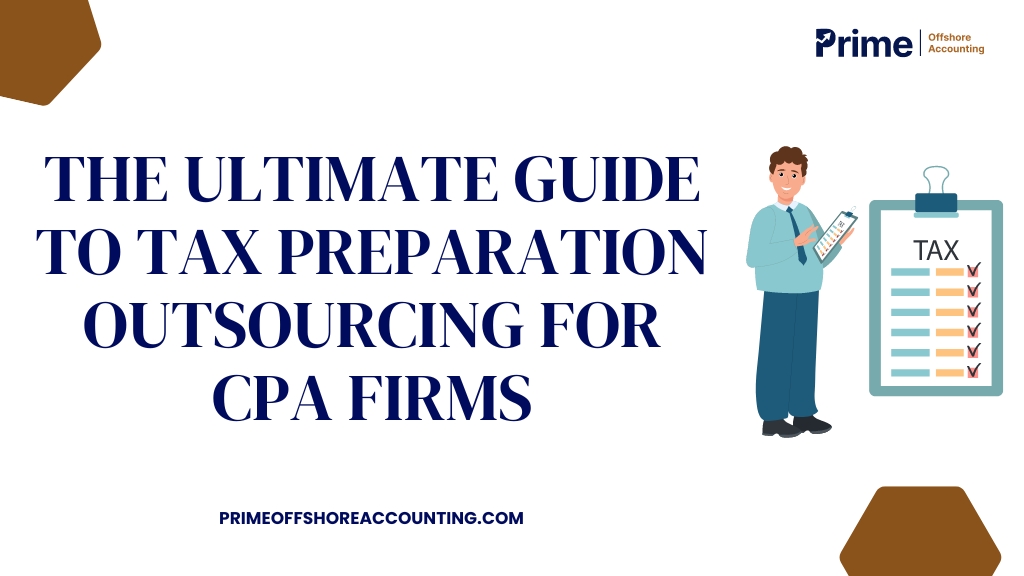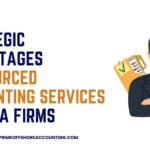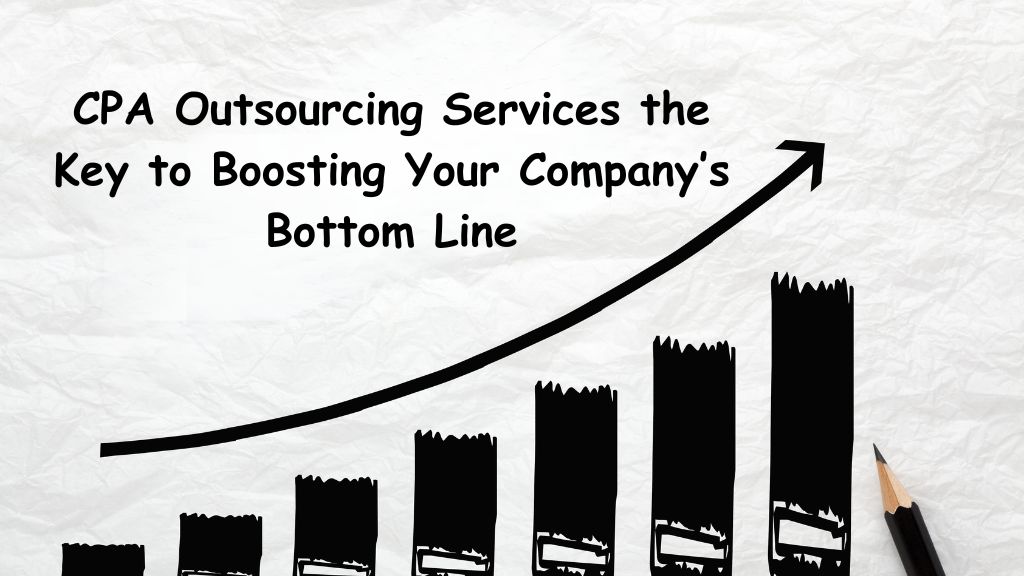Table of Content
- 1 What is Tax Preparation Outsourcing?
- 2 Why Should CPA Firms Consider Outsourcing Tax Preparation?
- 3 What Services Can Be Outsourced for Tax Preparation?
- 4 How to Choose the Right Outsourcing Partner for Tax Preparation?
- 5 What Are the Steps Involved in Outsourcing Tax Preparation?
- 6 What Are the Best Practices for Successful Tax Preparation Outsourcing?
- 7 Frequently Asked Questions
- 7.0.1 What is tax preparation outsourcing for CPA firms?
- 7.0.2 Why should CPA firms consider outsourcing tax preparation?
- 7.0.3 How does tax preparation outsourcing work?
- 7.0.4 What are the benefits of using an outsourcing company for tax preparation?
- 7.0.5 Are there any risks associated with tax preparation outsourcing?
- 7.0.6 How can CPA firms find the right outsourcing partner for tax preparation?
Are you a CPA firm looking to streamline your tax preparation process and boost efficiency? Look no further!
In this comprehensive guide, we will explore the benefits of outsourcing tax preparation, the services that can be outsourced, how to choose the right outsourcing partner, the steps involved in outsourcing, and the best practices for successful outsourcing.
From cost savings to access to expertise, this guide has everything you need to know to make informed decisions for your firm. Let’s get started!
What is Tax Preparation Outsourcing?
Tax preparation outsourcing refers to the practice of entrusting tax-related tasks, such as tax return preparation and compliance activities, to external service providers or firms.
This approach allows CPA firms to focus on core competencies like advisory services and financial planning, rather than getting bogged down by the time-consuming intricacies of tax preparation. By leveraging the expertise of outsourcing partners, CPA firms can ensure accuracy and efficiency in their tax processes, ultimately leading to improved client satisfaction and retention.
Services offered by outsourcing providers may encompass tax planning, research, filing, and even representation during audits, providing a comprehensive solution that streamlines the tax workflow for firms. This strategic partnership not only enhances operational efficiency but also allows CPA firms to scale their services without the burden of hiring additional in-house staff.
Why Should CPA Firms Consider Outsourcing Tax Preparation?
CPA firms should consider outsourcing tax preparation to optimize their operations, reduce costs, enhance efficiency, ensure compliance with tax regulations, and elevate client satisfaction levels.
Outsourcing tax preparation services offers CPA firms a multitude of advantages. By leveraging the expertise of specialized outsourcing partners, firms can access cost-effective solutions that allow them to allocate resources more efficiently. This strategic move not only streamlines the tax preparation process but also helps in maintaining high professional standards and ensuring accuracy in tax filings.
Outsourcing enables CPA firms to focus on core business activities, foster stronger client relationships through improved service delivery, and keep up with the evolving complexities of tax laws and regulations.
Cost Savings
One of the primary advantages of outsourcing tax preparation for CPA firms is the significant cost savings it can offer, allowing firms to allocate resources more efficiently and maximize their revenue potential.
- By delegating tax preparation tasks to specialized outsourcing providers, CPA firms can reduce overhead costs associated with hiring and training in-house staff. This streamlined approach not only cuts down on direct labor expenses but also minimizes the need for investing in costly tax software and infrastructure.
- Outsourcing enables firms to scale their operations more flexibly, adapting to seasonal fluctuations in workload without the burden of maintaining a full-time workforce. As a result, CPA firms can achieve greater cost-effectiveness and operational efficiency, freeing up resources to focus on business development and client service.”
Increased Efficiency
Outsourcing tax preparation can lead to increased efficiency within CPA firms by streamlining tax processes, automating workflows, and leveraging external expertise to enhance operational effectiveness.
By outsourcing tax preparation tasks, CPA firms can optimize their internal processes, allowing them to focus more on core business activities. With workflow automation, routine tasks can be completed more quickly and accurately, reducing the chances of errors and enhancing overall productivity. External expertise brought in through outsourcing can bring fresh perspectives and specialized knowledge, enabling CPA firms to improve their service offerings and provide higher-quality tax solutions to clients. This combination of process optimization, workflow automation, and expert input leads to a seamless operational structure that maximizes efficiencies and effectiveness.
Access to Expertise
By outsourcing tax preparation, CPA firms gain access to specialized expertise from offshore partners or industry experts, enabling them to deliver high-quality services that meet professional standards.
This access to diverse expertise is crucial for CPA firms as it allows them to tap into a pool of knowledge and skills that they may not have in-house. By leveraging offshore resources, they can reduce operational costs without compromising on service quality. Outsourcing tax preparation enables CPA firms to stay updated on industry best practices and regulations, ensuring that they provide accurate and compliant services to their clients. Expert knowledge and quality control are key components in maintaining a competitive edge in today’s dynamic business environment.
Time Savings
Outsourcing tax preparation allows CPA firms to save valuable time by delegating time-consuming tasks to external partners, improving service delivery timelines, and leveraging performance metrics for continuous improvement.
This strategic move frees up internal resources to focus on core business activities, increasing productivity and efficiency. With the burden of tax preparation lifted, CPA firms can redirect their energy towards more strategic pursuits, such as client interaction, advisory services, and business development.
By entrusting specialized tasks to outsourcing partners, firms can ensure that tax-related processes are handled with precision and accuracy, enhancing client satisfaction and loyalty. Performance metrics play a crucial role in monitoring outcomes, enabling firms to track progress, identify areas for enhancement, and drive continuous process optimization.
Tax preparation outsourcing empowers CPA firms to streamline operations, deliver high-quality services consistently, and stay ahead in a competitive market landscape.
What Services Can Be Outsourced for Tax Preparation?
Various services can be outsourced for tax preparation, including tax return preparation, tax planning and consulting, bookkeeping and accounting, as well as payroll processing to enhance operational efficiency.
Outsourcing tax return preparation can help in streamlining the filing process, ensuring accuracy in calculations and adherence to compliance requirements.
Tax planning and consulting services provided by external experts can assist in minimizing tax liabilities and maximizing returns.
Outsourcing bookkeeping and accounting tasks can help in maintaining accurate financial records, tracking expenses, and ensuring timely reporting.
Payroll processing services outsourced to professionals can ensure efficient payroll management, including salary calculations, tax deductions, and compliance with labor laws.
Tax Return Preparation
Outsourcing tax return preparation involves entrusting the accurate and timely filing of tax returns to external partners who ensure data accuracy and uphold quality assurance standards.
This process is vital as it not only alleviates the burden from in-house teams but also allows experts to handle complex tax regulations and compliance issues efficiently. By leveraging the expertise of external partners, companies can enhance their tax reporting accuracy and minimize the risk of errors or non-compliance. Quality assurance measures, such as regular audits and reviews, play a crucial role in maintaining the integrity of financial data and ensuring that tax returns meet professional standards set by governing bodies.
Tax Planning and Consulting
Outsourcing tax planning and consulting allows CPA firms to leverage strategic expertise for tax optimization, efficient planning, and comprehensive strategies that align with client objectives.
By partnering with external experts in tax planning and consulting, CPA firms can tap into a wealth of knowledge and experience in navigating complex tax regulations and identifying opportunities for savings. These experts can offer fresh perspectives and insights that may not be readily available in-house, leading to innovative strategies and customized solutions for each client’s unique situation. Outsourcing these services can help minimize risks and errors, ensuring compliance with changing tax laws and regulations while staying ahead of industry trends.
Bookkeeping and Accounting
Outsourcing bookkeeping and accounting services for tax preparation involves delegating financial reporting, data analytics, and accounting tasks to external partners for enhanced data management and financial analysis.
By entrusting these critical functions to specialized professionals, businesses can access advanced financial management techniques and gain valuable insights from data-driven analysis. Skilled outsourcing partners offer expertise in organizing financial records, ensuring compliance with regulatory requirements, and optimizing financial processes for efficient tax planning.
Through outsourcing, companies can benefit from streamlined operations, cost savings, and improved decision-making based on reliable financial data. This strategic approach not only enhances accuracy in financial reporting but also provides a competitive edge through access to cutting-edge data analytics capabilities.
Payroll Processing
Outsourcing payroll processing tasks involves external partners handling billing processes, ensuring data security, and managing payroll operations efficiently to streamline financial workflows.
By entrusting these responsibilities to experienced professionals, businesses can benefit from quick and accurate billing processes, leading to improved cash flow management. Outsourcing allows companies to leverage advanced data security measures implemented by specialized payroll providers, reducing the risk of data breaches and ensuring compliance with strict regulatory requirements. Accurate payroll management plays a critical role in building employee trust and satisfaction, which are essential for maintaining a positive work environment and fostering productivity within the organization.
How to Choose the Right Outsourcing Partner for Tax Preparation?
Selecting the right outsourcing partner for tax preparation involves thorough vendor selection, assessing offshore partners, establishing service level agreements, and conducting due diligence to ensure a reliable partnership.
When guiding CPA firms through the process of choosing an ideal outsourcing partner, it is essential to emphasize the significance of thorough vendor evaluations. In this stage, evaluating the potential partner’s track record, financial stability, regulatory compliance, and technology capabilities is crucial.
Exploring offshore collaborations can provide cost-effective solutions, so understanding the risks and benefits associated with offshore partnerships is essential. Establishing clear agreement structures, including outlining responsibilities, timelines, and confidentiality protocols, helps in setting expectations and avoiding misunderstandings.
Experience and Expertise
- When selecting an outsourcing partner for tax preparation, prioritize experience, expertise in industry best practices, effective vendor management, and seamless integration with your firm’s operations.
Choosing an experienced partner with a deep understanding of tax regulations and a track record of success in the financial services sector can significantly enhance the efficiency and accuracy of your tax processes. An outsourcing provider proficient in vendor management can help streamline communication and ensure timely delivery of services. By aligning with a partner that adheres to best practices, you can mitigate risks and optimize the overall tax preparation workflow for your firm.
Data Security Measures
Ensuring robust data security measures, including confidentiality agreements and leveraging technology advancements, is critical when selecting an outsourcing partner for tax preparation to safeguard sensitive client information.
Confidentiality agreements play a crucial role in outlining the terms and conditions under which the outsourcing partner must handle and protect confidential data. These agreements serve as legal safeguards to ensure that sensitive information is not misused or shared without authorization.
Leveraging technological advancements such as encrypted communication channels and secure data storage systems further enhances the protection of client data. Implementing strict data protection protocols, such as regular security audits and real-time monitoring, is also essential in maintaining a secure environment for handling confidential information.
Communication and Support
Effective communication channels, client support, and remote collaboration capabilities are essential criteria when choosing an outsourcing partner for tax preparation to ensure seamless interactions and operational alignment.
These communication and support mechanisms play a crucial role in the success of any outsourcing venture, especially in today’s digital age where teams are often spread across different locations. Remote collaboration tools enable teams to work together efficiently, regardless of geographical barriers.
Client interaction channels facilitate prompt responses and foster strong relationships with customers, leading to increased satisfaction and loyalty. In the realm of successful outsourcing, effective communication serves as the backbone that underpins smooth project execution and delivery.
By incorporating these remote teamwork and client engagement strategies into their partner selection process, businesses can position themselves for sustained growth and success.
Pricing and Payment Structure
Evaluate pricing models, transparent payment structures, and service delivery terms when choosing an outsourcing partner for tax preparation to ensure cost-effective collaborations and streamlined billing processes.
Considering the financial arrangements and payment processes is crucial to establishing a mutually beneficial partnership with a CPA firm. Collaborating with a reputable partner requires a thorough evaluation of billing accuracy, cost allocation, and adherence to agreed-upon service delivery timelines.
By emphasizing transparent pricing structures and clear invoicing protocols, both parties can avoid misunderstandings and maintain trust throughout the partnership. Efficiently managing costs and payments is vital for fostering a long-term relationship that benefits both the firm and the outsourcing partner.
What Are the Steps Involved in Outsourcing Tax Preparation?
The process of outsourcing tax preparation entails assessing firm needs, selecting the right partner, establishing communication processes, and implementing a comprehensive outsourcing plan for efficient service delivery.
- Assessing the firm’s requirements involves a thorough evaluation of existing tax preparation procedures, identifying areas for improvement, and setting clear objectives for outsourcing.
- Once the needs assessment is complete, selecting the ideal partner becomes crucial. Finding a provider with expertise in tax laws, a proven track record in accurate filings, and a commitment to client satisfaction is key.
- Establishing efficient communication channels between the outsourcing firm and the partner ensures seamless collaboration.
- Implementing the outsourcing plan involves setting performance metrics, defining roles and responsibilities, and regular monitoring to enhance operational efficiency and maintain high levels of client engagement.
Assessing Your Firm’s Needs
Start the outsourcing process by assessing your firm’s specific needs, conducting risk assessments, understanding client expectations, and identifying potential problem-solving areas to tailor outsourcing solutions effectively.
This initial needs assessment stage plays a critical role in the outsourcing journey as it sets the groundwork for a successful partnership. By thoroughly evaluating the risks involved, such as operational, financial, and compliance risks, companies can proactively address potential challenges before they escalate.
Aligning client expectations during this phase ensures that the outsourcing provider understands the desired outcomes and can deliver client-centric solutions that meet or exceed expectations. Effective problem-solving strategies are also crucial in this phase to anticipate and resolve any issues that may arise during the outsourcing engagement, fostering a collaborative and mutually beneficial relationship between the client and the service provider.
Researching and Selecting an Outsourcing Partner
Research potential outsourcing partners, conduct due diligence, evaluate service delivery capabilities, and prioritize industry expertise to make informed decisions when selecting the right partner for tax preparation.
When guiding CPA firms through the partner selection process, it is crucial to thoroughly research vendors to ensure compatibility with the firm’s values and goals. Due diligence practices should include examining the partner’s reputation, financial stability, and track record. Evaluating service delivery capabilities involves assessing the partner’s technology infrastructure, scalability, and customer service standards. Industry knowledge is key in understanding complex tax regulations and industry-specific challenges that may impact service quality. Incorporating these factors into the selection process can lead to a successful and fruitful partnership for the firm.
Establishing Communication and Processes
Establish clear communication channels, promote team collaboration, focus on process efficiency, and implement performance evaluation mechanisms to ensure seamless interactions and operational effectiveness in tax preparation outsourcing.
By fostering transparent communication methods, teams can enhance their collaborative efforts and cultivate a shared understanding of project goals. Emphasizing efficient processes not only streamlines workflows but also minimizes errors and delays. Regular performance assessments help identify areas for improvement and maintain high standards of quality. These elements collectively contribute to building strong and successful outsourcing relationships, where each party is empowered to work cohesively towards achieving common objectives.
Implementing the Outsourcing Plan
Execute the outsourcing plan systematically, focus on project management strategies, implement training programs, ensure quality control measures, and prioritize continuous improvement initiatives to optimize tax preparation outcomes.
- During the implementation phase of tax preparation outsourcing, project management protocols play a crucial role in ensuring that tasks are assigned effectively, timelines are met, and resources are utilized efficiently.
- Training initiatives are vital to equip team members with the necessary skills and knowledge to handle tax preparation tasks with accuracy and precision.
- Quality assurance practices, such as periodic audits and feedback mechanisms, help maintain high standards and identify areas for enhancement.
- Ongoing improvements, driven by feedback from stakeholders and analysis of performance metrics, are essential to optimize processes and ensure consistent quality in tax preparation services.
What Are the Best Practices for Successful Tax Preparation Outsourcing?
To achieve successful tax preparation outsourcing, firms should focus on establishing clear service level agreements, monitoring performance metrics, leveraging strategic planning approaches, and embracing continuous improvement practices.
These best practices not only facilitate smooth collaboration between the outsourcing partner and the firm but also enhance the overall efficiency of the tax preparation process.
Service level agreements help in setting clear expectations, while monitoring performance metrics ensures that the service provider meets the established benchmarks.
Strategic planning methodologies enable both parties to align their goals and objectives for optimal results.
Embracing continuous improvement fosters a culture of innovation and learning, leading to enhanced service delivery and process optimization.
Frequently Asked Questions
What is tax preparation outsourcing for CPA firms?
Tax preparation outsourcing for CPA firms refers to the process of hiring an external company or individual to handle the tax preparation process for a CPA firm’s clients. This can include tasks such as data entry, tax form preparation, and filing.
Why should CPA firms consider outsourcing tax preparation?
Outsourcing tax preparation can save CPA firms time and resources, allowing them to focus on other important areas of their business. It can also improve efficiency and accuracy in the tax preparation process, as outsourcing companies are often specialized and experienced in this specific area.
How does tax preparation outsourcing work?
First, the CPA firm and the outsourcing company will establish a partnership and determine the scope of work to be outsourced. The outsourcing company will then collect the necessary documents and data from the CPA firm’s clients, and use this information to prepare and file their taxes. The CPA firm will still be involved in reviewing and approving the final tax documents before they are submitted to the appropriate authorities.
What are the benefits of using an outsourcing company for tax preparation?
Besides saving time and resources, using an outsourcing company for tax preparation can also provide CPA firms with access to advanced technology and specialized knowledge. This can lead to increased efficiency, accuracy, and ultimately, client satisfaction.
Are there any risks associated with tax preparation outsourcing?
While there are risks associated with any business decision, choosing a reputable and experienced outsourcing company can mitigate these risks. It is important for CPA firms to thoroughly research and vet potential outsourcing partners to ensure they are trustworthy and capable of handling sensitive client information.
How can CPA firms find the right outsourcing partner for tax preparation?
To find the right outsourcing partner for tax preparation, CPA firms can ask for recommendations from colleagues, do online research, and conduct interviews with potential partners. It is important to consider factors such as experience, security measures, and pricing when making a decision.








